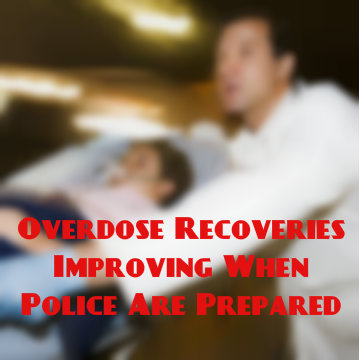How Can Overdose Recoveries Improve When Police Are Prepared?
Police officers are often the first medical responders on the scene of drug-related overdose emergencies. A new study published online in the journal Drug and Alcohol Dependence shows that the preparedness of police officers when responding to an overdose could affect the outcomes for the individual as well as the community.
The study focused on areas of Rhode Island and Connecticut that have been experiencing growing numbers of prescription opioid overdose emergencies. Many of these were relatively sparsely populated suburban and rural areas, where emergency medical technicians (EMTs) and paramedics are a more limited resource. In these areas, police officers are more likely to be first medical responders than in areas with more hospitals and associated emergency medical personnel.
Traci C. Green, Ph.D., a research scientist at the department of emergency medicine for Rhode Island Hospital, was the lead investigator for the new study. Green and her fellow researchers conducted interviews with law enforcement officers. The interviews included questions about personal attitudes toward drug users and victims of overdoses, as well as questions about the resources and protocol for police officers who are the first responders to the scene of an overdose.
Study Finds Frustration And Confusion Among Law Enforcement
 They discovered a range of personal attitudes among police officers toward drug users, as well as confusion about what treatment police officers are expected and authorized to perform at the scene of drug-related emergencies. Many police officers are equipped only with basic first aid and CPR training, and can do little to save the life of an overdose victim in critical condition.
They discovered a range of personal attitudes among police officers toward drug users, as well as confusion about what treatment police officers are expected and authorized to perform at the scene of drug-related emergencies. Many police officers are equipped only with basic first aid and CPR training, and can do little to save the life of an overdose victim in critical condition.
Some police officers revealed negative attitudes about people who use drugs, particularly repeat offenders. Others were empathetic toward those suffering from drug addiction but also expressed frustration with the lack of comprehensive treatment and other resources for drug addicts. Quite a few believed that the cycle of addiction had a significant negative impact on the individuals in their community as well as on the community as a whole. Many police officers in the study also revealed frustration about the limited training and resources they themselves have when responding to an overdose scene.
Frustration with the growing problem of prescription drug abuse and overdose is understandable. In 2010, more than 8.76 million people reported abusing prescription medicine, and in 2008, there were more than 36,000 deaths from drug overdoses, most of those caused by prescription drugs. In fact, prescription painkillers in the form of opioids are responsible for three quarters of all overdoses from prescription medications. Cocaine and heroin combined resulted in fewer overdose deaths than prescription opioids.
Giving Police Officers Tools And Training For Overdose
In some communities around the country, police officers and other responders are given Naloxone, which is the standard drug overdose antidote used by paramedics. Naloxone helps to reverse the effects of prescription opioids and to restore breathing for people in respiratory arrest. The current White House Office of National Drug Control Policy supports training more responders in the use of this tool and making it available to those in a position to be first medical responders.
The responses in the Rhode Island Hospital study suggest that police officers will be more effective in the role of first responders with increased training and improved understanding of their responsibilities. In more rural areas, police officers may be the only trained medical responders who are able to get to overdose victims during the critical window when Naloxone or other treatment methods are most likely to be effective.
Further empowering police officers to be more effective responders may also help to improve the relationship between law enforcement and the community in many areas. It may relieve some feelings of frustration and helplessness on the part of police officers by allowing them to have a more active role in saving lives. It may also improve community views on law enforcement when officers at the scene are able to administer life-saving aid. Some of the police officers interviewed during this study felt that the ability to administer Naloxone could be a critical element in positive police-community relations.
Read More About ER Visits Rising Due To Drug Use



